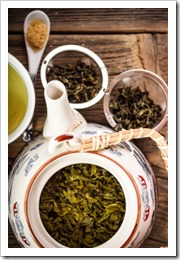This double-blinded, placebo-controlled randomized clinical trial evaluated the efficacy and safety of green tea extract on uterine fibroid burden and quality of life in reproductive aged women with symptomatic uterine fibroids.
A total of 39 reproductive aged women ages 18-50 y.o. with symptomatic uterine fibroids were recruited. Eligible women included those with a follicle-stimulating hormone (FSH) less than 10mIU/L, at least moderately severe uterine fibroid related symptoms with a score of > 25 on the Uterine Fibroid Symptom and Health-Related Quality of Life Questionnaire subscale (UFS-QOL). All the women had at least one fibroid measuring 2 cm or larger based on transvaginal and/or transabdominal ultrasound and a total uterine volume of > 160 mL by vaginal and abdominal ultrasound.
Twenty two were randomized to receive green tea extract and 17 to receive placebo.
Study subjects were randomized to oral green tea  extract (45% epigallocatechin gallate= EGCG) or placebo of brown rice, daily, for 4 months. Each green tea capsule contained 95% polyphenols and 45% EGCG. Women received two capsules daily of either green tea or placebo.
extract (45% epigallocatechin gallate= EGCG) or placebo of brown rice, daily, for 4 months. Each green tea capsule contained 95% polyphenols and 45% EGCG. Women received two capsules daily of either green tea or placebo.
Uterine fibroid volumes were measured at beginning and end of the study. The fibroid specific symptom severity and quality of life questionnaires were scored at each monthly visit.
The mean change in both the volume and number of uterine fibroids was assessed by transvaginal ultrasound (TVU) and/or transabdominal ultrasound at baseline and at the end of the 4 month treatment period.
The secondary measure at each visit was the mean change in fibroid specific health related quality of life (UFS-QOL), and the health related quality of life (HRQL) questionnaire. Blood loss was also assessed monthly with a menstrual log and visual assessment of quantity.
Of the 39 women, 33 were compliant and completed the five visit study over the 4 month period. Of the final 11 women who completed the placebo group, fibroid volume increased by 24.3% over the study period. Of the final 22 women in the green tea extract group, a significant uterine fibroid total volume reduction of 32.6% was observed. The green tea extract group also had a significant reduction in fibroid specific symptom severity of 32.4% and a significant improvement in HRQL of 18.53% compared to the placebo group. Anemia improved significantly by 0.7 g/dL in the green tea group and the average blood loss significantly decreased from 71 mL/month to 45 mL/month. There were no adverse effects or endometrial hyperplasia or pathology in either group.
Commentary:
Green tea, especially its epigallocatechin gallate (EGCG) constituent has anti-inflammatory, antiproliferative and antioxidant effects. The study’s authors attributed the reduction in fibroid size from EGCG due to an inhibitory effect on leiomyoma tumor cell proliferation and apoptosis induction.
More than half of women ages 35-49 in the U.S. are affected by uterine fibroids and are more prevalent in African American women. These benign growths can cause acute and chronic pelvic pain, excessive uterine bleeding, dyspareunia, iron deficiency anemia, miscarriage, infertility, constipation and/or irregular bowel habits and urinary incontinence. The impact of these complications on a woman’s health can be significant and currently, there is no effective long-term medical treatment for these common benign tumors. Short term conventional management options include gonadotropin-releasing hormone analogues but are only approved for short term preoperative adjuvant use due to their risk of significant and irreversible bone loss, osteoporosis and other major side effects. Progestogen or hormonal contraceptive management is sometimes helpful to control bleeding. If symptoms impact quality of life significantly, or fibroid removal could improve miscarriage and/or fertility, or there is medical urgency due to bleeding, then management options range include hysteroscopic resection of submucosal fibroids, hysterectomy, myomectomy, uterine artery embolization or image-guided focused ultrasound thermal therapy. Milder cases usually involve just observation, especially in asymptomatic fibroids, or the patient putting up with her symptoms.
This study, of a simple and safe botanical option such as green tea extract, is a welcomed noninvasive intervention for treatment and/or prevention of uterine fibroids and could be a game changer for many women suffering from uterine fibroids.
Reference
Roshdy E, Rajaratnam V, Maitra S, et al. Treatment of symptomatic uterine fibroids with green tea extract: a pilot randomized controlled clinical study. Int J Womens Health. 2013;5:477-486.

